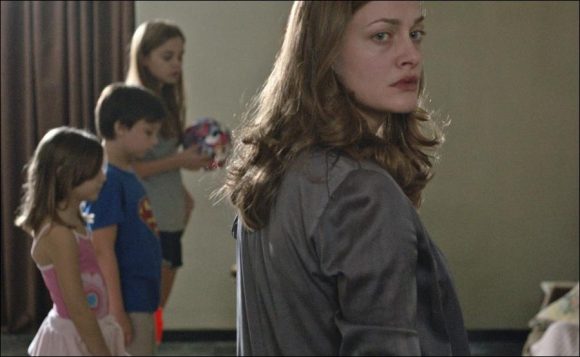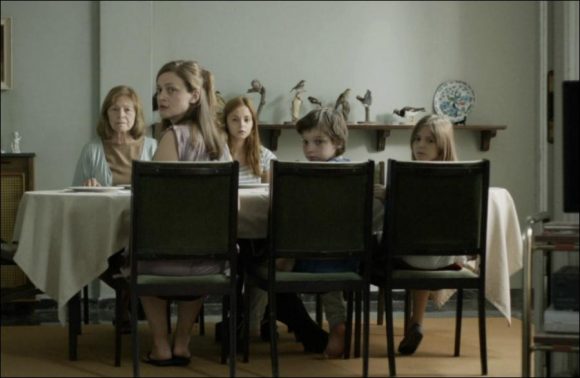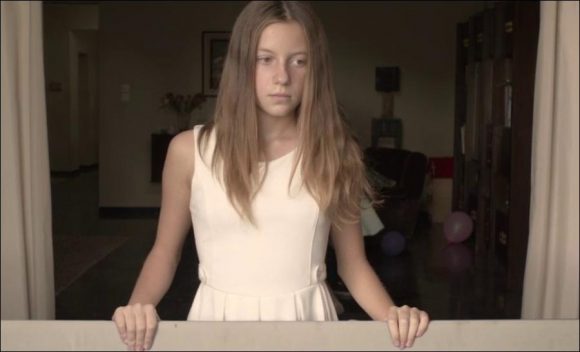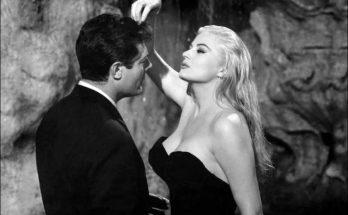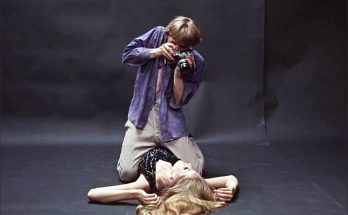Taglines: Nothing of what you see is what it seems.
Before the birthday cake is cut for her 11th birthday, after talking to her sister in the closed room, Angeliki comes after her sister. We can’t see her face in the first scene, but when she starts dancing with her grandfather who is trying to immortalize this happy moment with a camera smiling, we see Angeliki’s sullen face.
After dancing with Leonard Cohen’s Me Dance Me to the End of Love ”music, Angeliki moves away from his father to the balcony of their house, watches the scene, corrects the face he has just hung, and then leaves himself a last smile and commits suicide. While the film’s genre appears on her body, we see a family of six, consisting of husband and wife, two sisters and grandchildren, gathered around Angeliki; From the first scene, the director increases the severity of the message he wants to give about the family, because the family gathered around the body of the little girl is content with just looking at it. This is the synopsis of the film, a family full of ‘caring’ people.
It will be enough to know that the film is a family drama that concerns the country, since what is told after the 11-year-old Angeliki’s suicide will be either false information or important information about the content of the film. So that you will understand that my efforts to describe the sister-sister, husband and wife, grandchildren and similar family members that I use to describe the birthday are futile.
Because in this altı community altı of six people, grandfather-grandmother, grandchildren and similar acceptances accepted by the society are not valid in this film. The grandfather, father, state, law of the family, Philippos, exaggerated efforts to return the family back to its former state after the suicide of his little grandson, and as he spent time with the family in the process, sitting next to them at the table, spending time in the hall, the doors in the house before the locks were taken. we will begin to understand that some things are not going well in the family as they witness their dismantling.
So what could be the reason for an eleven-year-old little girl to jump off the balcony without thinking at a time when she could be thought of as the happiest moment on her birthday, and what are the ‘things that don’t go well acak in the family to disregard this death? These are the questions that the film tries to answer by stretching the audience for an hour and a half, and the director and screenwriter Alexandros Avranas takes the pen after a small child in Berlin commits suicide and forms the contours of the film at the end of the three-day drafting process. He questions why a little girl would commit suicide and takes advantage of the crisis of the crisis in her country to create a story of ‘looking and staying kalma.
Miss Violence is a minimalist film that has a meaning valued by family secrets. Even though I think that Alexandros Avranas is forced to find the ends at some points, he has signed scenes that do not distract the audience, clean workmanship, stretching the tension and may even have difficulty watching in some scenes. The retro atmosphere and pastel colors of the film are a perfect match for the cold and movements of the family members. There are those who have compared the director’s style to Michael Haneke, but I don’t agree with this as the director himself.
From this point on, I will write about the scenes that contain important information about the film, so I recommend that you read the rest of the article after watching the film. Director Alexandros Avranas enriches the narrative language with the door scenes that we are used to see in Zeki Demirkubuz films while revealing the secrets of his universal family, who cannot be understood who is who at first glance, away from Greek culture.
We see that the baba father tutan character, who keeps control of the family and constantly gives orders to each individual what to do, takes out the locks of the doors and even removes them while checking their daughters and grandchildren. He wants every member of his family to be transparent. To further strengthen this relationship, the director shows in particular that the door of the neighboring character’s house, which is a normal individual in response to the abnormal family, is locked.
It is difficult to solve this mysterious situation until the last quarter of the film, a passive woman who never makes her voice as a grandmother, her daughter Angeliki’s mother is a mentally ill woman and children who constantly act with orders robot all of them are controlled by the father figure with violence, authority and pressure. even when it turns out that grandchildren were marketed by their father to foreign men, and Angeliki preferred to die before he was included in this system, we realized that he was actually facing a run-away during his birthday.
Violence has entered the nest, has taken control of each individual of the nest, has put individuals into jobs where morality and freedom are ignored, and even though the new seeds of violence have begun to spread out, the biggest problem the film poses is the fact that nobody wants to go out the door of the house. Either you follow the order and become a slave of the order, you either kill yourself and become out of the system, or you lock the door and hide inside, you become the element the system has forgotten.
But no matter what, you will never dare to go outside and question the system. The fact that Alexandros Avranas made a state-father, country-family comparison at the end of the story, the grandmother’s character, who stabbed the family father in the name of saving the future of the past and locking the door as the first job, was pictured in the film as an insufficient solution.
Avranas, who has created a film that disturbs the viewers from a disturbing thought, does not have a successful criticism of the system. However, when I look at it in the context of the story, I think it would be better if the film had distant realistic, distressing scenes that would undermine the credibility of its criticism, if there were some more action-free, minimalist choices and psychologically strangled our soul.
Other technical features of a successful venue-sound design is one of the features that attract attention at first. The players’ blood-freezing performances are also remarkable. The film, which was awarded with awards from the Venice Film Festival’s director and leading actor, was on the Mined Zone program at the Istanbul Film Festival this year.
Miss Violence (2013)
Directed by: Alexandros Avranas
Starring: Themis Panou, Reni Pittaki, Eleni Roussinou, Sissy Toumasi, Kalliopi Zontanou, Constantinos Athanasiades, Chloe Bolota, Rafika Chawishe, Martha Bouziouri
Screenplay by: Alexandros Avranas, Kostas Peroulis
Cinematography by: Olympia Mytilinaiou
Film Editing by: Nikos Helidonidis
Costume Design by: Despina Chimona
Art Direction by: Thanassis Demiris, Eva Manidaki
MPAA Rating: None.
Distributed by: Metrodome Distribution
Release Date: November 8, 2013 (Greece), June 7, 2014 (United States)
Visits: 249
